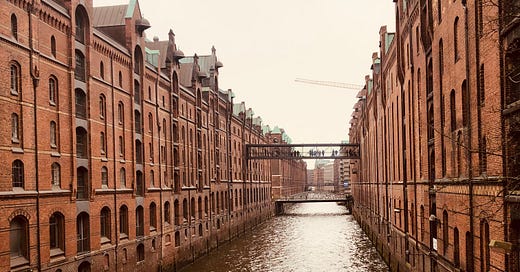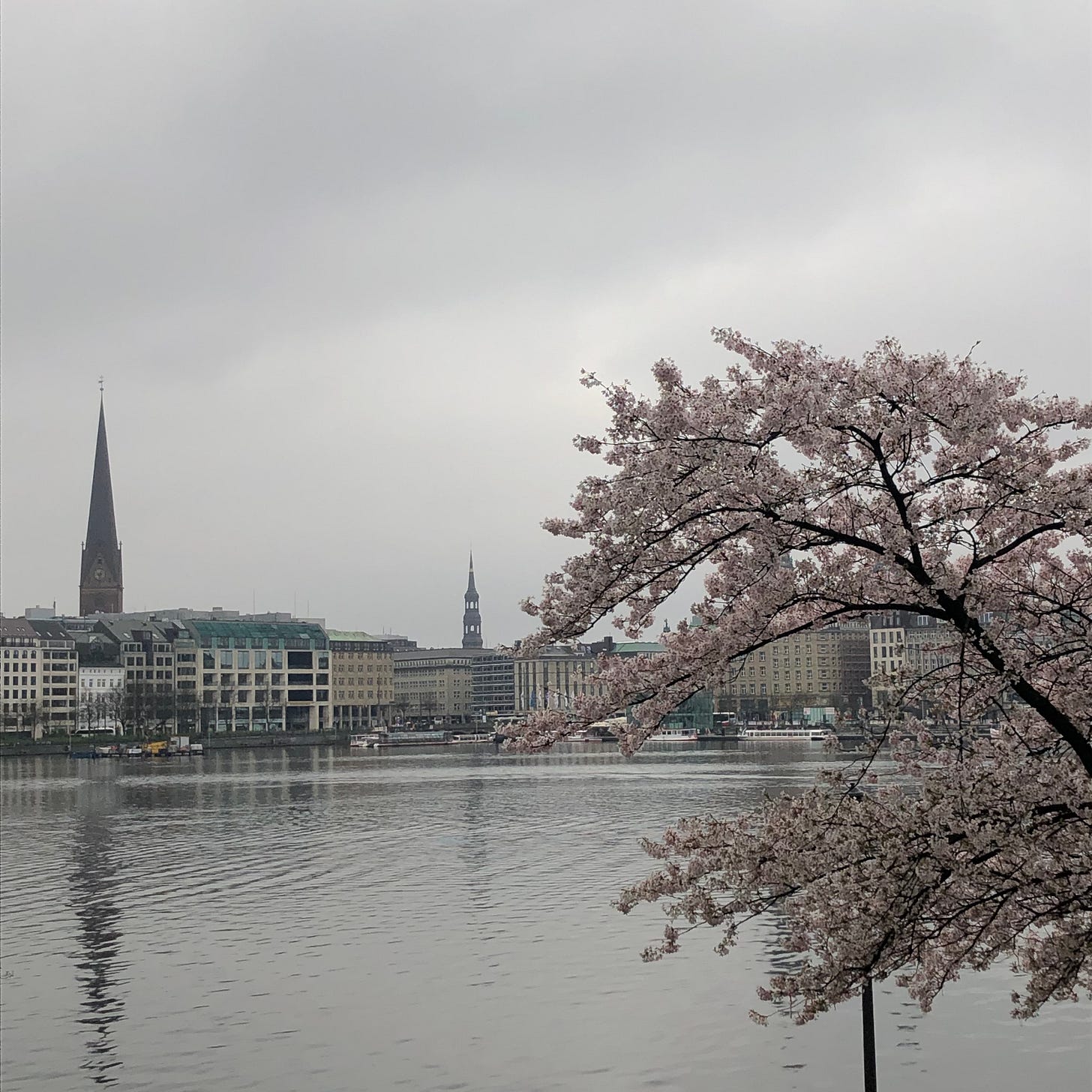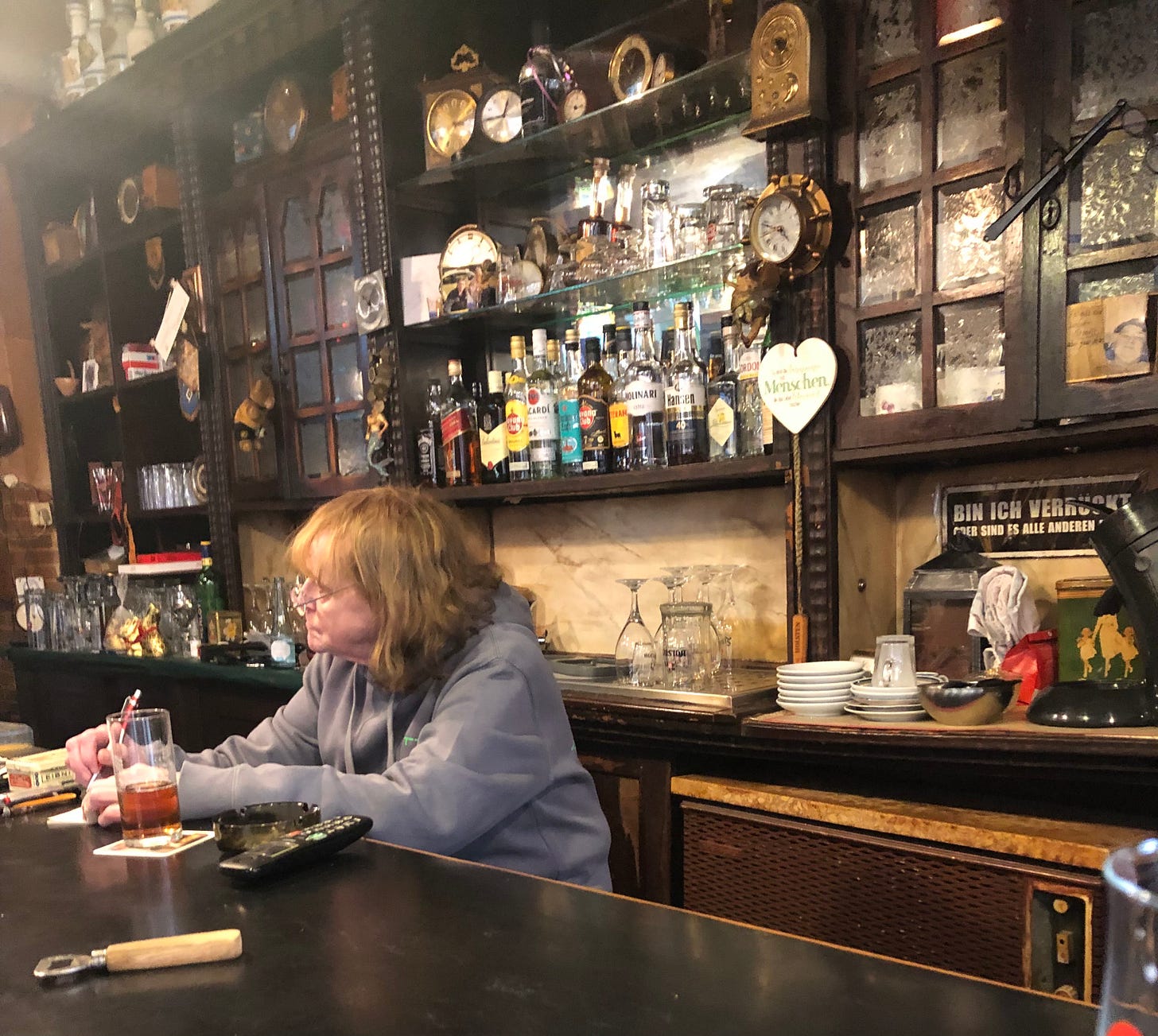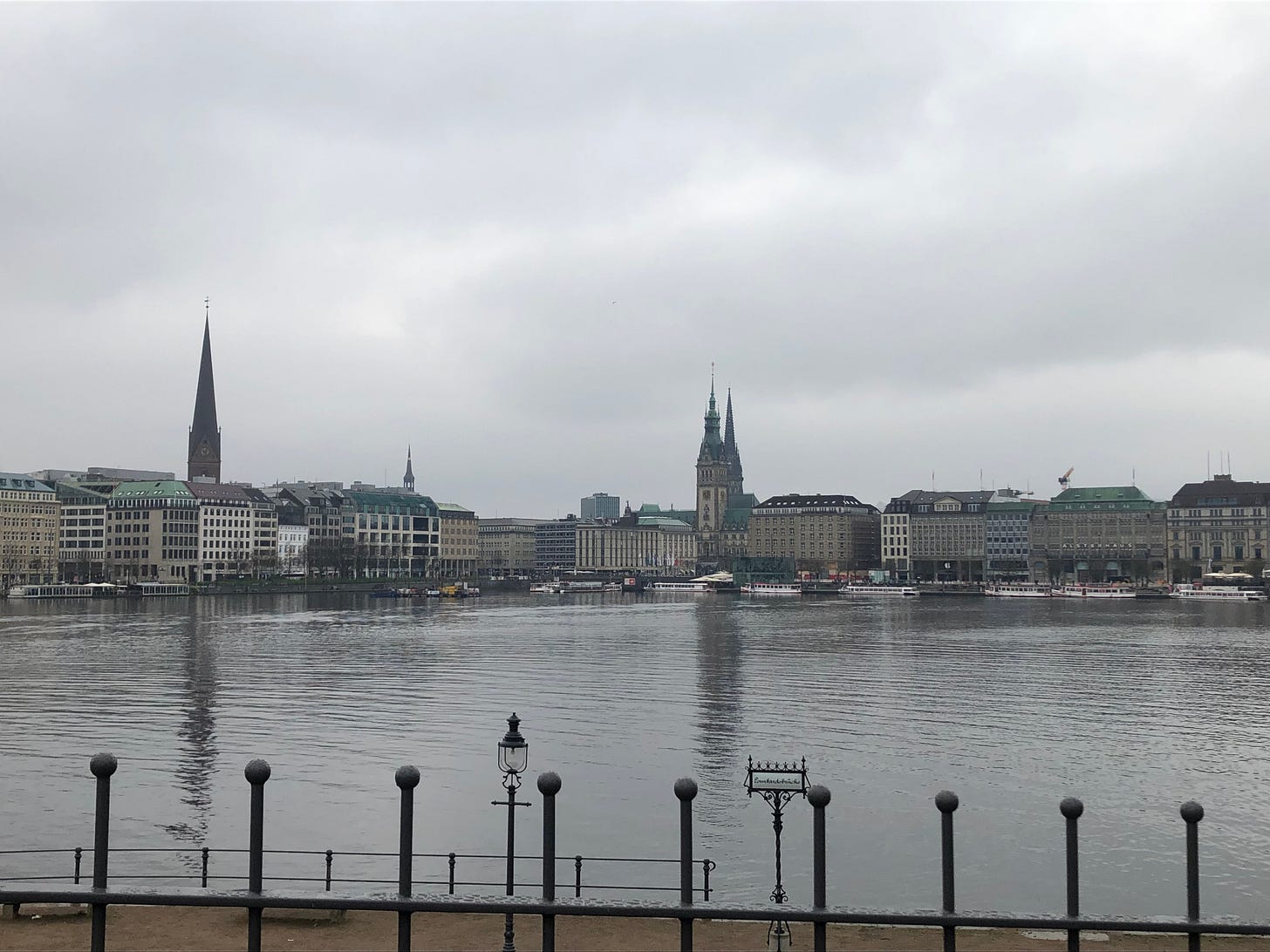As the train pulled out of Copenhagen Central Station, I tucked my phone into my bag.
Ahead of me lay a nearly five-hour journey to Hamburg, a city I had never before visited, and the first destination in what I hoped would be a series of travels made without the internet. I’ve written about my reasons for this undertaking here, so I’ll just sum it up like this: By traveling without Google or GPS maps or or online booking systems or restaurant review sites or Instagram or Uber or AirBnB, I hoped to recover some of the serendipity that was once an inherent part of every journey.
But full disclosure: I took my phone out before we had even cleared the outskirts of the city. Across the aisle from me an adult woman clutched a teddy bear in a way that would have been the perfect metaphor for how most of us feel about our phones, if it weren’t for the fact that she was also scrolling on her phone. Still, I had to sneak a photo.
I put my phone away again, and started ruminating instead. There was so much about the trip that was uncertain. What if all the hotel rooms were booked? How would I decide where to eat? What if I got lost and ended up in a dangerous neighborhood? Did Hamburg have dangerous neighborhoods? Did it have anything interesting at all, and if not, what the hell was I going to write about? And, most naggingly: how would I ever get through all those moments in the day–the line at the cashier; the solo dinner; the five-hour train ride—without my phone to entertain me?
That was the trickiest thing. So long as there was something to look at out the train window–a village; a newborn colt stretching its legs; graffiti warning Democracy Is Now a Commodity –I was fine. But as soon as we returned to the flat monotony that is the Danish countryside, as soon as I felt the slightest inkling of boredom, in other words, I felt the urge to reach for my phone. Was it going to be like this all weekend?
By mid-day, it was time to find out. One of the great things about European train stations is that they almost always have tourist information offices where actual people will give you advice and maps for free. Admittedly, the overall experience is highly dependent on which actual person gives you the advice and maps, and in Hamburg, I got an iron-haired lady who was unimpressed to learn I had turned up in her city without the slightest sense of what to do there. She shoved a few extra brochures in my hands, and I headed out through a train station that smelled deliciously of kebabs and doughnuts, and tried to orient myself.
Without a blinking blue dot to aid me, this was harder than usual, but after a couple of false starts, I found myself on a broad boulevard called Monckestrasse, and headed toward what signs assured me was the Rathaus, or city hall. It was a sunny day, and the boulevard, lined with the usual Zaras and H&Ms, was bustling with shoppers. Beyond the election posters and an adorable local sweets shop with jars of candy alligators, there was little that seemed distinctive; I could have been in any prosperous European city, albeit one with an inordinately high number of burger joints.
I wandered aimlessly: into a church that turned out to be Hamburg’s oldest and to contain a painting of the Resurrection in which a Jesus with a markedly receding hairline rose over his sleeping followers with limbs akimbo as if he were taking a bow in his first Broadway show; into the architecturally overwrought Rathaus; around a pretty lake, right in the middle of the city, lined with blossoming almond trees.
I passed a cafe that had just opened its canalside terrace for the season, and was marking the occasion with live music and what it called ‘day drinking specials’ that turned out to be slightly discounted Aperol Spritzes. I sat down for a sandwich, and with no phone to look at while I waited for it to arrive, scanned the room. A Goth-looking girl next to me was eating a slice of marble cake and reading an Irving Yalom novel, so I asked her about it. It turned out that he was her favorite author, though she preferred his nonfiction. “Especially,” she said, “the one about death.”
Until this point, I had somehow forgotten that I needed to find a place to stay, so I decided to take care of that before it got too late. The prospect made me slightly nervous, because although there had been quite a few chain hotels right outside the train station, I hadn’t really seen any once I got to the center of town. But after about 30 minutes criss-crossing the streets in the center, I finally found one. Its brass fixtures and dated decor suggested its best days were behind it, and when I asked the new and somewhat flummoxed receptionist for a room, she went over to an elegant man in a suit and whispered nervously that there was “ein walk-in.” He glided over to welcome me, handing over a key and, before I could even ask, suggesting I take a look at the room before booking it.
The room was functional, clean, and utterly lacking in personality (if you don’t count the weird way Germans have of making a bed: individual duvets folded into tight thirds; squishy pillows set on their edge, and punched down in the middle to form two peaks.) But the staff were friendly, the price was right, and the hotel itself turned out to be over a hundred years old, and run by a single family. I dropped my backpack, told reception I’d take the room, and headed back out into the city, map in hand.
My plan was to hit some of the spots marked on it: St Michael’s church, the warehouse district, the new concert hall. But as I left the church and headed down to the river, I passed an intriguing-looking bar. Outside, signs and haunted-looking photographs testified to the place’s hundred year history. But one glance inside at the tobacco-stained walls and vintage clocks everywhere spoke far more eloquently.
What really pulled me in were the two occupants. On one side of the bar sat the bartender, hunched and smoking from a Joker-style cigarette holder, a half-inch of exposed gray ringing her dull red hair. Across from her was a paunchy, comparatively younger man in a canary-yellow polo shirt. Both of them had half- drained glasses in front of them.
One of the things that I hope to do with this project is discover whether it is possible, if we put down our phones, to connect more with other people. And this scenario—two locals cornered in a picturesque setting, alcohol already surging through their bloodstreams—seemed especially ripe with promise. I could see it already: I’d walk in, they’d greet me warmly, and eagerly answer my polite questions. I’d buy them a round, they’d regale me with stories about what Hamburg was like back in the day. There would be schnapps, and bonhomie, and promises to continue the conversation next time I was in town.
So even though I didn’t especially want a drink, I walked in and sat down at the bar. Both bartender and patron looked in my direction in a way that didn’t seem unfriendly. I ordered a beer, and she put down her cigarette holder to pull it.
“Is this bar really 100 years old?” I asked.
“Yes,” she said. Encouraged that she spoke English, I plowed ahead.
“And has it always been owned by the same family?” She looked at me without comprehension.
I tried rephrasing. Finally, another word: no.
I asked about the clocks. This time there was not even a flicker of response, as if, having exhausted the two words of her English vocabulary, she had simply switched off the sound. I turned to the man. He shrugged, and quickly turned to the tv screen mounted over the slot machine.
I wish I could say the silence felt companionable but it did not. I still had ¾ of a pint left, and I had left the book I brought to Hamburg precisely as protection against this kind of awkwardness back in the hotel. I tried to count all the clocks in the room. I studied my map with great intensity. I ran my fingers over the small brass plaques affixed to the underside of the bar and read the names of what I guessed, though will never know for sure, were regulars: Kapitan Diamanter, Schlingo. I wished Schlingo were there. He sounds like a guy who would have talked to me.
Finally, I had finished enough of my beer that I felt I could leave without offending anyone. I paid hurriedly, and nearly ran out the door. When I realized a few meters away that I had accidentally left my map inside, I couldn’t bring myself to return and retrieve it.
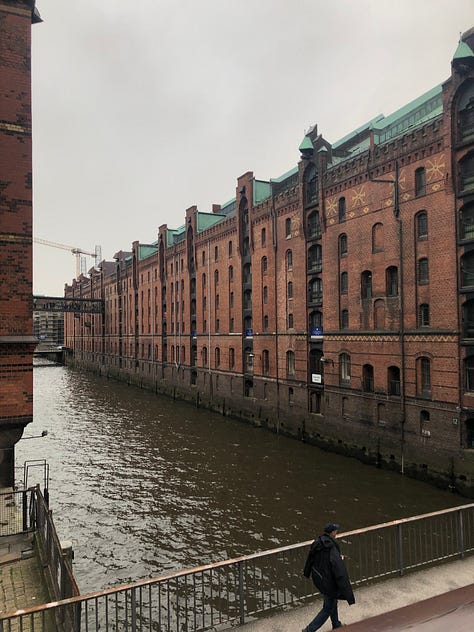
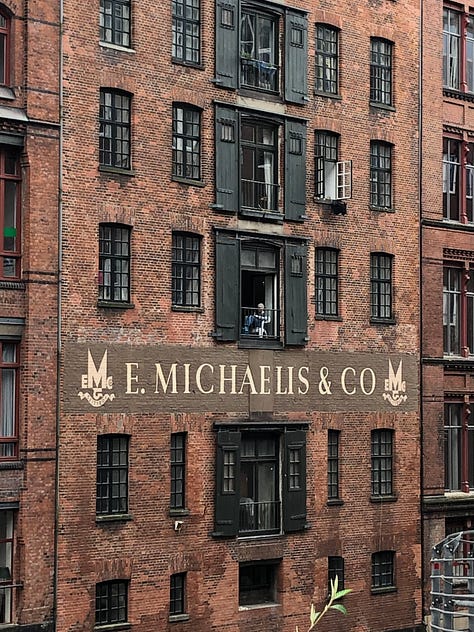
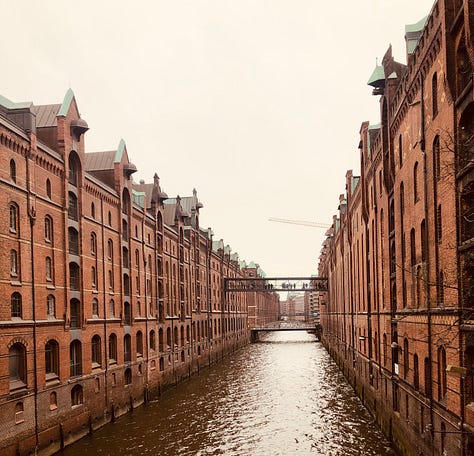
There was a lot to like about Hamburg. For one, there were a lot of canals–more, I would learn later, than Venice and Amsterdam combined–and they seemed to be everywhere in the city; I’d be strolling through what looked to be a boring business district and then suddenly, there’d be this charming little waterway. My favorites were in the Speicherstadt, where the canals allowed ships to once pull up directly to warehouses to unload their cargo.
Hamburg is not one of those cities like Paris or Florence or even Copenhagen, where you turn a corner and suddenly find yourself overwhelmed by beauty. But neither is it ostentatiously hideous, which is saying something for a city that had been thoroughly ravaged by fire in 1842 and then had the shit bombed out of it a century later. Mostly it’s staid and modestly attractive, with the occasional bit of bizarreness (a restaurant whose outdoor seating consisted of giant plastic bubbles set among Alice-in-Wonderland toadstools; a massive bunker that once housed 25,000 people and is now being turned into some kind of tree-topped urban recreation center) to keep things interesting.
I wandered through the vintage clothing shops of the scruffy Karolinakvartel, and found myself at the gates of a massive fair where I learned that schmalzkuchen is not–as my fellow shtetl descendants might believe—a chicken fat pastry, but rather the German word for funnel cake.

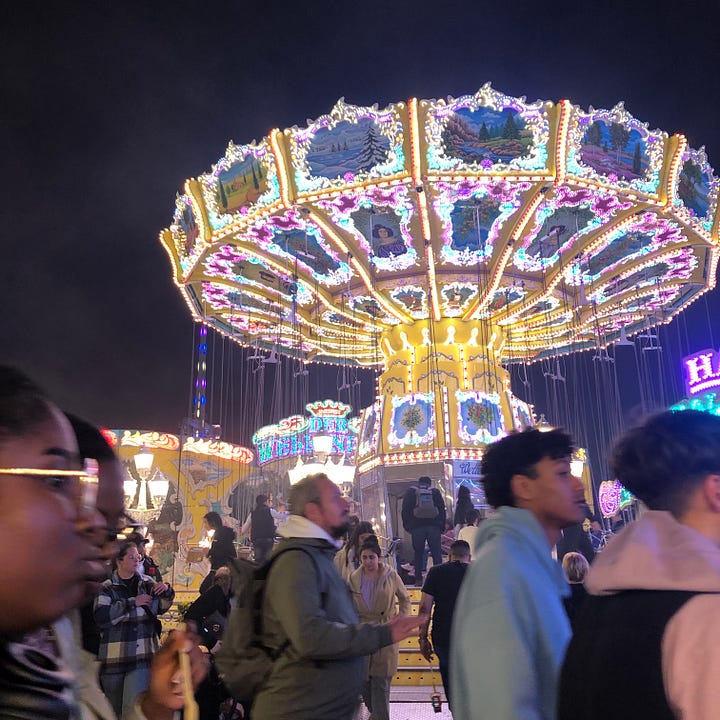
My best Hamburg experience came late at night. When I had stopped in St Petri church earlier in the day, I had noticed an announcement that the Hamburg Bach Chorus would be singing that night at the Easter Vigil. Returning to the church at 10.30pm, I entered a pitch black nave, and was handed an unlit candle. A few panes of the stained glass window in the apse were illuminated, but otherwise all was blackness, and I could hear but not see others as I stumbled down the aisle for a seat. Then we all sat quietly in the dark, ancient space, and waited for the service to begin.
At last, a disembodied voice pierced the abyss with a reading from what I was very proud of myself for figuring out was Genesis (it was in German). From the choir stall, the most ethereal singing followed, made all the more transcendent by the fact that we were still sitting in total darkness. Finally, a soft glow began emanating from the back of the church, as the choir, led by a priest bearing a very large candle, processed to the altar. As the service went on, the glow in the church grew, as the choir members lit the long tapers they carried and then spread out through the nave to light the votives the rest of us held. When, precisely at midnight, the church bells pealed and the priest proclaimed the resurrection, the lights came up, first in the apse, and then in the rest of the church. It was hard not to get goosebumps, if only for the excellent stagecraft.
The streets were nearly empty when I left the church for what I calculated would be a 20-minute walk back to my hotel. Another one of my goals with this project is to make room for the possibility of getting lost, a form of uncertainty that the satellite connection we all carry in our pockets has pretty much eradicated. But the thing about getting lost is you can’t really do it unless you have a destination. Up until that point in Hamburg, I was just wandering. But now, well past midnight in a cold and empty city, I did, and it was that weirdly made-up bed back in my 100-year-old hotel. Although I knew it was nearby, I couldn’t locate the exact street or even a familiar landmark, and instead found myself circling the same path again and again.
I could have asked one of the few passersby to point me in the right direction, but going up to a stranger at that hour and announcing my cluelessness didn’t necessarily seem like the smartest move. Plus, I was pretty sure they would just pull out their phone and find my hotel that way. Of course I could have pulled out my own phone and resolved it instantly, but that would have meant capitulating on the bet I had made with myself. And so I kept walking, becoming more and more frustrated as I tried to figure my way out of a self-imposed maze. (Though the frustration must have shaken something loose because it was only now that I realized that all those burger joints? Hamburger Bank, Hamburger Kiosk, and the confusingly named Hamburger Coffee? Not actually burger joints at all.)
Finally, in desperation, it came to me: I could take a taxi. I started walking toward a busier street to hail a cab. But just when I got to the corner, I spied a shop I recognized from an earlier walk. One turn to the right, and there was the polished brass awning of my hotel.
Between the midnight Vigil and getting lost, I slept through the one thing the tourist office brochure insisted I do, which was to visit the fish market that takes place every Sunday morning before 9.30am. Instead, I wandered through the Eppendorf neighborhood and looked at the Jugendstil architecture. I went to the art museum where, having failed to purchase tickets online several months ago, I missed out on seeing the Casper David Friedrich exhibition, but saw a captivating contemporary rendition of his most famous painting. And just before I left town, I had the one truly excellent meal of my time in Hamburg at a Turkish restaurant not far from the train station.
I can’t say this first foray into analogue travel was an unmitigated success. I had found the character-filled, century-old bar, but hadn’t connected with anyone in it. My ratio of great meals to meh was not high. I had gotten lost, and not in a good way.
But there was one thing that made me feel better about it: an intimation—a sign, even— that I was on the right track.
It had happened at the Vigil the night before. As a hundred or so of us sat waiting in the chilly dark for the service to begin, a kind of calmness settled that made the silence itself feel profound, like it was something we had agreed to create together. Suddenly, however, it was disturbed by a bright light blinking from the back of the church that swept drunkly across the pews, momentarily blinding their occupants. Behind this brutal light came a woman in a puffer coat, stomping noisily down the aisle before taking a seat in the front. A murmur of disapproval rippled through the congregation at the interloper who had broken its meditative peace. Do I need to say it? The thing that had ruined the moment and broken the mood? It was the flashlight on the puffer-coat woman’s phone.
The Addresses
Below, paid subscribers will find a list of the places where I ate, drank, shopped, and stayed in Hamburg. But, a gentle reminder: wouldn’t it be more fun to find your own?

